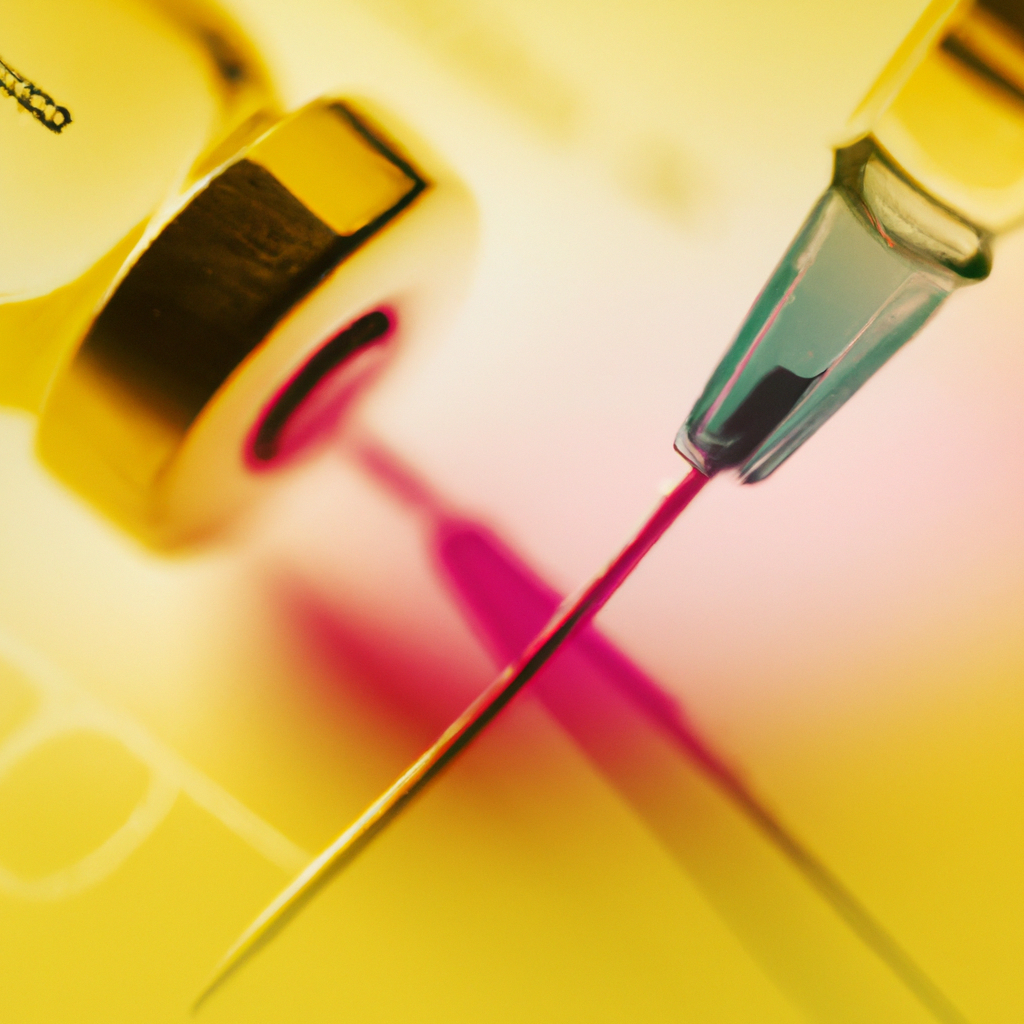Boldly pushing the boundaries of scientific advancement, the future of vaccine research unveils a captivating world where imagination and innovation entwine. As humanity collectively stands at the precipice of a new era, armed with cutting-edge technologies and unprecedented discoveries, the prospect of conquering formidable diseases becomes increasingly tangible. Through this captivating article, we embark on a remarkable journey through the realm of vaccines, exploring the remarkable strides made by scientists and the promising possibilities that await us on this path. So, fasten your seatbelts, dear readers, for we are about to embark on an awe-inspiring adventure into the future of vaccine research!
1. Unlocking the Immune System’s Potential: Revolutionizing Vaccine Research
In the awe-inspiring world of medical research, breakthroughs are constantly pushing boundaries and expanding our understanding of the human body. One such groundbreaking area is the exploration of the immune system’s potential in revolutionizing vaccine research. Scientists around the globe are harnessing the incredible power of our body’s natural defenses to develop innovative approaches for immunization.
Harnessing the immune system’s potential represents a paradigm shift in the field of vaccine development. Traditional vaccines primarily used weakened or inactivated pathogens to stimulate an immune response. However, recent advancements have led to the exploration of novel techniques that leverage the immune system’s finesse. By activating specific components and mechanisms within our body’s defense system, researchers aim to develop vaccines that are not only effective against a wider range of infections but also provide long-lasting protection.
This research has paved the way for groundbreaking discoveries, such as the development of mRNA vaccines. These vaccines function by delivering genetic instructions to our cells, instructing them to produce harmless fragments of the pathogen. These fragments trigger an immune response, educating our immune system to identify and neutralize the actual pathogen should we encounter it in the future. The success of mRNA vaccines in combating diseases like COVID-19 has demonstrated the potential to rapidly develop vaccines against emerging viral threats.
Moreover, our evolving understanding of the immune system’s intricacies has also led to the development of new adjuvants. Adjuvants are substances added to vaccines to enhance the immune response. Scientists are exploring novel adjuvants that can stimulate specific immune cells, optimize antibody production, and further augment the effectiveness of vaccines. These advancements not only facilitate the development of more potent vaccines but also boost the immune response in vulnerable populations, such as the elderly or those with weakened immune systems.
- Enhanced efficacy: By unlocking the potential of the immune system, vaccines can provide higher levels of protection against a wider range of infections.
- Long-lasting immunity: Innovative vaccine research aims to develop immunizations that offer extended periods of protection, reducing the need for frequent booster shots.
- Rapid response capabilities: The utilization of mRNA vaccines showcases the ability to swiftly adapt and develop vaccines against emerging viral threats.
- Improved adjuvants: Advances in adjuvant technology enable a stronger immune response, ensuring vaccines are highly effective across diverse populations.
2. From DNA Engineering to Nanotechnology: Pioneering Breakthroughs in Vaccine Development
Advancements in scientific research have paved the way for groundbreaking breakthroughs in vaccine development. From DNA engineering to nanotechnology, scientists have been pushing the boundaries of innovation to create effective and efficient vaccines to combat various diseases.
One area of pioneering research is DNA engineering. By manipulating and modifying the genetic material, scientists can design vaccines that directly target specific diseases at their core. This approach offers immense potential for creating vaccines that are highly targeted, precise, and capable of generating a strong immune response.
Nanotechnology, on the other hand, focuses on manipulating matter at an incredibly small scale. With nanoparticles as small as a billionth of a meter, scientists can engineer vaccines that enhance their delivery, stability, and efficacy. These tiny particles can encapsulate antigens, helping to effectively stimulate the immune system and trigger a robust response.
Moreover, the combination of DNA engineering and nanotechnology has opened new avenues in vaccine development. By incorporating synthetic DNA into nanoparticles, researchers are able to optimize immunogenicity and tailor vaccines specifically to an individual’s genetic makeup, offering personalized protection against diseases.
These remarkable breakthroughs have revolutionized the field of vaccine development and hold immense promise for the future. As scientists continue to push the boundaries of innovation, we can anticipate even greater advancements that will shape the landscape of public health and eradicate diseases that once posed significant threats to humanity.
3. In Silico Vaccinomics: Harnessing Big Data and Artificial Intelligence for Precision Immunization
In the rapidly advancing field of vaccinomics, scientists are now leveraging the power of big data and artificial intelligence (AI) to revolutionize the way we approach precision immunization. This exciting discipline, known as in silico vaccinomics, holds tremendous potential to expedite the discovery, development, and deployment of highly effective vaccines.
By harnessing big data, researchers are able to analyze vast amounts of genomic, proteomic, and immunological information to gain valuable insights into the complex interactions between pathogens and our immune system. AI algorithms play a crucial role in processing and interpreting this data, enabling the identification of specific genetic markers, immune responses, and potential vaccine targets.
The use of AI in in silico vaccinomics also allows scientists to optimize vaccine design by predicting the efficacy, safety, and stability of potential candidates. This empowers researchers to prioritize the most promising vaccine formulations, saving time and resources that would otherwise be spent on unsuccessful experimental trials.
Furthermore, the integration of big data analytics and AI algorithms in vaccinomics facilitates the identification of population-specific genetic variations and immune profiles. This personalized approach to immunization enables the development of targeted vaccines tailored to the unique genetic makeup and immune response characteristics of individuals or specific populations.
4. CRISPR-Cas9: The Revolutionary Gene Editing Tool Shaping the Future of Vaccines
CRISPR-Cas9, the groundbreaking gene editing tool, has emerged as a revolutionary technology with the potential to reshape the future of vaccines. Harnessing the power of this molecular tool has opened up exciting possibilities for scientists and researchers to develop innovative strategies in the field of vaccine development.
One of the key advantages of CRISPR-Cas9 in vaccine research lies in its exceptional precision and efficiency. By utilizing the specificity of this tool, scientists can accurately target and edit specific genes responsible for disease-causing antigens, enabling them to create highly tailored vaccines. This gene editing technique allows for the fine-tuning of vaccine candidates, enhancing their effectiveness and reducing potential risks.
Additionally, the potential of CRISPR-Cas9 extends beyond just creating new vaccines; it also offers a promising avenue for improving existing ones. By using this genetic tool, scientists can modify the efficacy of current vaccines, optimize dosages, or even develop booster shots to create long-lasting immunity against diseases.
The advent of CRISPR-Cas9 in the field of vaccine development represents a significant step forward, bringing us closer to personalized and more effective preventative treatments. As researchers continue to explore and refine this revolutionary gene editing tool, its potential impact on shaping the future of vaccines remains truly awe-inspiring.
5. Virtual Reality Vaccinations: Transforming the Experience of Immunization
Virtual reality technology has revolutionized various fields, and now it’s making its way into the world of healthcare. One area where it is starting to make a significant impact is in the experience of immunization. Gone are the days of dread and anxiety associated with getting a shot; virtual reality is transforming the immunization experience into something more engaging and less frightening.
Imagine stepping into a virtual world where you are no longer in a doctor’s office but surrounded by serene landscapes or whimsical animated characters. As you put on the VR headset, you are transported to a different reality, one where the anticipation and discomfort of vaccination are replaced by a sense of wonder and distraction. This immersive experience takes your mind off the needle and injects a sense of calm and relaxation into the procedure.
Doctors and medical professionals have reported that using virtual reality during vaccinations has had a remarkable effect on patients. Here are some of the benefits that this innovative technology brings to the table:
- Reduced anxiety: Virtual reality provides a highly effective distraction from the anticipation and pain associated with immunizations, significantly reducing anxiety levels in patients of all ages.
- Enhanced comfort: By immersing patients in captivating virtual environments, virtual reality creates a soothing atmosphere that promotes relaxation, making the vaccination process more comfortable.
- Improved cooperation: For young children who may be fearful or uncooperative during vaccinations, virtual reality takes them on an exciting adventure, allowing them to cooperate better and receive the necessary immunization with less resistance.
- Empowerment through education: Virtual reality not only distracts but also educates patients about the procedure they are undergoing. Patients can learn about the importance of vaccinations and how they work, empowering them with knowledge and understanding.
As virtual reality continues to evolve, its potential for transforming not only the experience of immunization but also healthcare as a whole is immense. By providing a more engaging and interactive environment, virtual reality is paving the way for a future where medical procedures are less intimidating, more pleasant, and ultimately more effective.
6. Beyond Traditional Vaccines: Exploring the Promise of mRNA and Viral Vector Technologies
As we step into the future, the field of vaccination is embracing groundbreaking technologies that go beyond the conventional methods. Two revolutionary approaches that hold immense promise in the fight against diseases are mRNA (messenger RNA) and viral vector technologies. These cutting-edge techniques are paving the way for more effective and adaptable vaccines that can combat a wide array of infections.
mRNA vaccines, such as the ones developed against COVID-19, harness the power of genetic material to stimulate an immune response. Unlike traditional vaccines that contain weakened or inactivated viruses, mRNA vaccines deliver a small fragment of genetic material from the virus. This fragment instructs our cells to produce harmless viral proteins, triggering an immune response. With their ability to swiftly adapt to new variants, mRNA vaccines have proven to be incredibly promising in protecting against emergent threats.
Another game-changer in the realm of vaccinations is viral vector technology. This approach employs modified viruses, known as vectors, to deliver specific genetic material into our cells. By introducing a harmless virus engineered with instructions to produce viral proteins, our immune system responds by mounting a defense against those proteins. Viral vector vaccines not only provide a potent immune response but also have a remarkable potential to elicit long-lasting immunity, making them a strong contender in tackling persistent and evolving pathogens.
Embracing these novel vaccine technologies holds boundless possibilities. By leveraging the flexibility of mRNA and viral vector platforms, scientists are exploring avenues to develop vaccines against challenging diseases like cancer, HIV, and malaria. Moreover, these breakthroughs could lead to the streamlined production of vaccines, enabling rapid deployment during outbreaks or pandemics. It’s an exciting era where molecular innovations are propelling the boundaries of vaccination, promising a future where diseases are better prevented, controlled, and eventually eradicated.
As we bid farewell to this exciting exploration into the future of vaccine research, we find ourselves standing at the precipice of possibility, brimming with hope and anticipation. The journey we embarked upon together has given us a glimpse into a realm where boundaries blur and miracles shimmer on the horizons of scientific endeavor.
Cutting-edge technologies and awe-inspiring innovations have punctuated this expedition, unveiling a tapestry of breakthroughs and discoveries that have forever altered the path of vaccine research. Intrepid scientists have harnessed the power of nanotechnology, genetic engineering, and artificial intelligence to redefine the very essence of what is achievable.
Imaging a world where vaccines can be administered through a breath, a simple patch on the skin, or perhaps even a flicker of light; a reality where emerging diseases are defeated before they gain a foothold, thanks to early warning systems powered by machine learning algorithms and real-time surveillance.
The magic of mRNA vaccines, igniting the fires of hope during the COVID-19 pandemic, now dances hand in hand with personalized vaccines that specifically target and annihilate cancer cells, transforming the war on diseases. From therapeutic breakthroughs to prophylactic triumphs, the future of vaccinations shines bright with the promises they hold for humanity.
While we cannot underestimate the challenges that lie ahead, from regulatory hurdles to ethical dilemmas, we embrace the unending determination of scientists, the unwavering support of governments, and the enduring faith of millions. Together, we can surmount any obstacle, forging a future where vaccines become guardians of our wellbeing, ever-vigilant against the threats that loom.
As we close the chapter on this exploration, we tread lightly on the shifting sands of time, knowing that at any moment, the next dazzling scientific revelation may present itself. So, let us hold hands, hearts brimming with optimism, as we continue to believe in the transformative power of vaccines, in the healing touch of scientific inquiry, and in a world where diseases are tamed, conquered, and consigned to the annals of history.
For the future of vaccine research is an ever-evolving tapestry of dreams, aspirations, and tireless collaborations. The symphony of discovery plays on, beckoning us to march forward, united in our pursuit of a healthier, safer, and brighter tomorrow.





